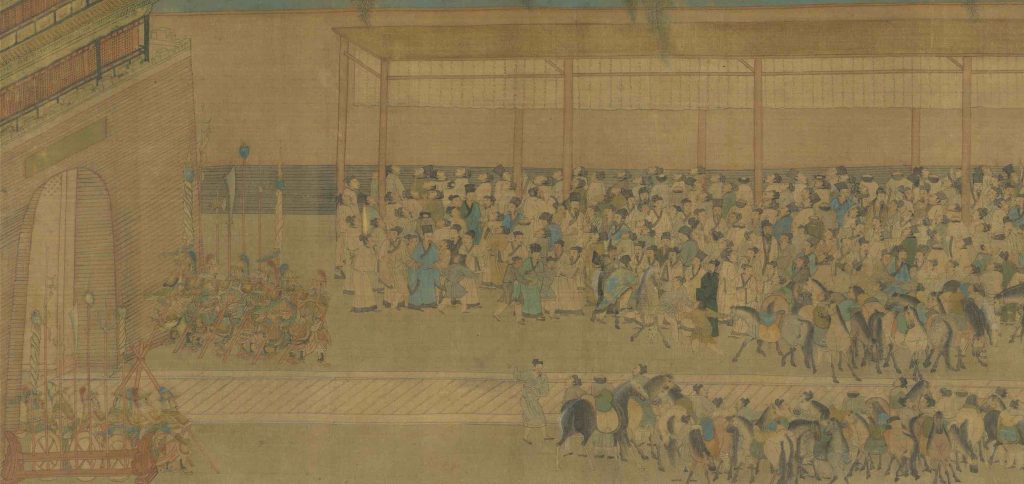1548 CE was another quietish year in the story of the development of Western imperialism. No matter. It gave me the chance to learn more about the Ming Empire in China, by virtue of the fact that during this year a rather interesting Ming official carried out notable actions against “pirates” of Portuguese and other nationalities… First, the bullet-points:
- In February, firearms were used for the first time in a battle in Japan. (Some Japanese parties had picked up the technology pretty speedily, having been introduced to a Portuguese version of it, via a famous Chinese pirate, just five years earlier.)
- In June, Ming Chinese naval forces destroyed the pirate haven of Shuangyu, frequented by Chinese, Japanese and Portuguese smugglers. The Ming forces were under the command of provincial governor Zhu Wan.
- In July, the 5-year-old Mary Queen of Scots was betrothed to the Crown Prince of France, who was then four. (They would marry when he was 14, and a year later he would become King Francis II upon the death of his father.) The betrothal was a significant diplomatic feat for the Scots and must have given the regents of England the heebie-jeebies.
- In August 1548, Mary was shipped to France to be raised alongside her intended. (The image above is part of a 1558 painting of the two.)
- In October, the conquistadores founded the city of La Paz in today’s Bolivia.
What we can learn from Zhu Wan’s career

Zhu Wan was born in 1494 CE in Changzhou and had a tough childhood, being bullied by his stepmother (his father’s principal wife) and his half-brothers. But he sat for his country’s daunting imperial examinations and in 1521 won the top-level jinshi degree, described as being “essential” for aspirants to high office in the bureaucracy.
English-WP tells us that the examination system, which had become formalized under the Tang dynasty (618-907 CE):
served to ensure a common knowledge of writing, the classics, and literary style among state officials. This common culture helped to unify the empire and the ideal of achievement by merit gave legitimacy to imperial rule. The examination system played a significant role in tempering the power of hereditary aristocracy, military authority, and the rise of a gentry class of scholar-bureaucrats.
(In Spain, by contrast, we were told that in recent years Charles V had been scurrying around to find enough letrados to run his still-emerging imperial/”national” administration… )
In 1547, Zhu was assigned as provincial governor of Zhejiang and neighboring Fujian, which were both undergoing a military emergency in the form of the raids and smuggling activities undertaken by the infamous wokou (pirates). These “pirates”, however, had many supporters and co-conspirators among the coastal gentry…
English-WP tells us that,
The situation on the coast had become very dire at the start of Zhu Wan’s tenure as grand coordinator. In December 1547, the Portuguese had plundered Zhangzhou, and in February the next year the cities of Ningbo and Taizhou were struck by an unprecedented 1,000 raiders aboard a hundred ships. This raid happened whilst Zhu Wan was inspecting in Fujian, and the government troops could not stop the raiders from killing, looting, and burning government offices and homes.[10] Despite the dismal state of coastal defence and the widespread collusion between the gentry and the pirates, Zhu Wan carried out his task energetically. He strictly enforced the maritime prohibitions, forbidding anyone from venturing out to sea on penalty of death, and put all ships to use for defence of the coast. He also publicized the names of the influential persons involved in the illegal trade, to the annoyance of the local gentry.[11] However, Zhu Wan was not entirely against foreign trade as he accommodated an official Japanese trading mission led by Sakugen Shūryō in early 1548—he had no problem with foreign trade in principle as long as it was done through the proper channels.[12]
On 15 April 1548, Zhu Wan’s fleet in Wenzhou set sail for the pirate haven Shuangyu under the command of Lu Tang and Ke Qiao (柯喬).[11] The fleet descended onto Shuangyu one night in June, under the cover of thick weather. Fifty-five to a few hundred smugglers perished in the attack, but leading figures such as Li Guangtou (李光頭) and Wang Zhi were able to escape. Lu Tang then razed the town and rendered the harbour permanently unusable by filling it in with stones under Zhu Wan’s orders.[13] Zhu Wan and his generals were greatly rewarded in silver for the victory, but he also drew the ire of his political enemies among the gentry, whose profits were directly affected by the destruction of Shuangyu. Eventually a pretense was found to demote Zhu Wan to the temporary position of inspector general (巡視), the argument being one man cannot control two provinces at the same time.[11]
Zhu might have destroyed the pirates’ safe haven in Shuangyu, but they then scattered up and down the coast. In a big battle the following year, Portuguese traders (or pirates? or conquistadores?) were apparently more directly involved, though it is hard to tell on whose side:
On 19 March 1549, Lu Tang and Ke Qiao [two of the principal wokou pirates] ambushed two junks in Zoumaxi while they were trading with the Portuguese aboard resulting in 33 deaths and 206 smugglers captured. Among the captured were Li Guangtou and a number of Portuguese men, and Lu Tang had four of the more good-looking Portuguese pretend to be kings of Malacca in order to make the victory seem more complete.[??] Fearing that the captives might bribe their way out, Zhu Wan executed 96 of the Chinese smugglers using his discretionary powers.
Well, that turned out to be his big mistake. Six weeks later, Zhu was impeached for exceeding his authority in the matter of the executions. The Jiajing Emperor– yes, that same cranky and brutal guy we’ve heard of before in this project– dismissed Zhu from his post and ordered a full investigation. Seeing the writing on the wall, Zhu wrote his own epitaph and killed himself by drinking poison.
English-WP tells us that his death:
was followed by the wholesale reversion of his policies, and the fleet that Zhu had assembled was dispersed.[22] For three years the position held by Zhu Wan remained vacant, and during these years apparently no government official dared to mention the coastal situation in the adverse political atmosphere. The coastal gentry had come out on top over Zhu Wan, but in doing so they created a military vacuum on the Chinese coast, of which the wokou raiders took full advantage when they intensified their raids for the coming decade.[23] Contemporaries and later historians lamented Zhu Wan’s fate for his righteousness and steadfast resistance against the influential families, and his name was finally cleared by the Wanli Emperor in December 22, 1587.
So the picture that seems to emerge is that, though China had this well-established, essentially meritocratic, and nationwide civil-service system, the country’s governance in the mid-16th century CE was still subject to a lot of particularist influences, especially among those coastal gentry. The eccentricity of the Jiajing Emperor’s behavior doubtless played a non-trivial role in this?
We also get a glimpse of how deeply involved the Portuguese adventurers were with some aspects of life along this portion of the Chinese coast…
